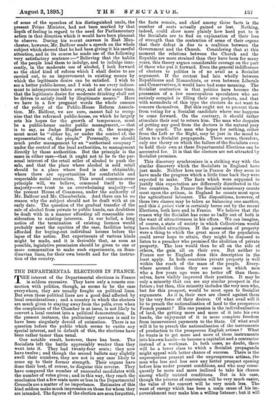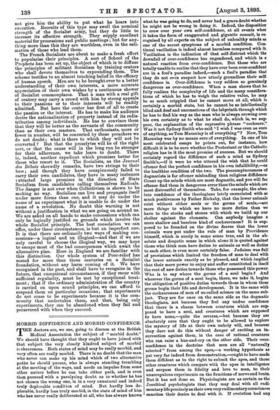THE DEPARTMENTAL ELECTIONS IN FRANCE. T HE interest of the Departmental
elections in France is seldom excessive. They have only a remote con- nection with politics, though, as seems to be the case everywhere, they are usually fought on political lines. But even these political lines are a good deal affected by local considerations ; and a country in which the electors are much given to staying away from the polls, even when the complexion of the Chamber is at issue, is not likely to convert a local contest into a political demonstration. In the present instance, the preliminary canvass is said to have been singularly devoid of animation. There is no question before the public which seems to excite any special interest, and in default of this, the elections have been rather tamer than usual.
One notable result, however, there has been. The Socialists left the battle appreciably weaker than they went into it. They had twenty-four seats ; they now have twelve ; and though the second ballots may slightly swell their numbers, they are not in any case likely to come up to their former strength. Their organs have done their best, of course to disguise this reverse. They have compared the number of successful candidates with the number of votes given; and in this way, they reach the conclusion that a few seats more or less in the Departmental Councils are a matter of no importance. Estimates of this kind seldom make much impression on those for whom they are intended. The figures of the election are soon forgotten, the facts remain, and chief among those facts is the number of seats actually gained or lost. Nothing, indeed, could show more plainly how hard put to it the Socialists are to find an explanation of their loss of strength than the contention of some of their organs that their defeat is due to a coalition between the Government and the Church. Considering that at this moment the relations between the Church and the Republic are more strained than they have been for many years, this theory argues considerable courage on the part of those who put it forward. Even the general indifference of electors to politics is of no avail as a Socialist argument. If the contest had lain wholly between Republicans and Monarchists, or even between Liberals and Conservatives, it would have had some meaning. The Socialist contention is that politics have become the possession of a few unscrupulous speculators who are entirely occupied in filling their own pockets, and that with scoundrels of this type the electors do not want to concern themselves. But this ought not to prevent them from voting for a Socialist candidate where one happens to come forward. On the contrary, it should rather stimulate their zeal to return him. The man who despairs of getting any good from the doctors is the natural prey of the quack. The man who hopes for nothing, either from the Left or the Right, may be just in the mood to listen to a Socialist propaganda. There seems, therefore, only one theory on which the failure of the Socialists even to hold their own at these Departmental Elections can be accounted for. It is that the electors are not attracted by Socialist promises.
This discovery synchronises in a striking way with the similar discovery which the Socialists in England have just made. Neither here nor in France do they seem to have made the progress which a little time back they were expected to make. The facts which were supposed to justify this expectation are differently distributed in the two countries. In France the Socialist missionary counts most upon the artisan, in England he counts most upon the agricultural labourer. The dispositions, however, of these two classes may be taken as balancing one another, and this a priori view is certainly borne out by the recent Elections, both here and in France. We believe that the reason why the Socialist has come so badly out of both is the want of attractiveness in his offers. We can imagine, of course, a state of society in which Collectivism would have decided attractions. If the possession of property were a thing to which the great mass of the population could never hope to attain, they might be disposed to listen to a preacher who promised the abolition of private property. The loss would then be all on the side of others, the gain all on their own. But neither to France nor to England does this description in the least apply. In both countries private property is well within the reach of the mass of the people. Every- where around them they see cases in which men who a few years ago were no better off than them- selves, have visibly improved their position. It may be only a minority that can see any similar prospect in the future ; but then, this minority includes the very men who, but for this prospect, would be most open to Socialist arguments. As it is, their ears are closed against them by the very force of their desires. Of what avail will it be to preach the nationalisation of land to the prosperous French peasant ? His one passion is the individualisation of land, the getting more and more of it into his own hands, the enjoyment of it in more complete freedom from inconvenient payments to the State. Of what avail will it be to preach the nationalisation of the instruments of production to the prosperous English artisan ? What he wants is to get more and more of .these instruments into his own hands—to become a capitalist and a contractor instead of a workman. In both cases, no doubt, there will be a lower class to which a Socialist propaganda might appeal with better chance of success. There is the nnprosperous peasant and the unprosperous artisan, the man who less and less sees any better prospect opening before him under present conditions, and who may conse- quently be more and more inclined to take his chance among wholly untried conditions. But in his case, though the process of conversion will be very much easier, the value of the convert will be very much less. The want of energy which has been a main cause of his im- poverishment may make him a willing listener but it will not give him the ability to put what he hears into execution. Recruits of this type may swell the nominal strength of the Socialist army, but they do little to increase its effective strength. They supply excellent material for processions and public meetings ; but for any- thing more than this they are worthless, even in the esti- mation of those who lead them.
The French Socialists are about to make a fresh effort to popularise their principles. A sort of School of the Prophets has been set up, the object of which is to diffuse the principles of militant Socialism by training orators who shall devote themselves to expounding them. The scheme testifies to an almost touching belief in the efficacy of human speech. Men are to be brought over to a better understanding of their own interests, a more accurate appreciation of their own wishes by a continuous shower of Socialist commonplaces. That a man with a real gift of oratory may carry a crowd with him by strong appeals to their passions or to their interests will be readily admitted. But here the orator has first of all to create the passion or the interest. He has to make his audience desire the nationalisation of property instead of its redis- tribution among individuals. He has to convince them that they will be better as the servants of the community than as their own masters. That enthusiasts, more or fewer in number, will be converted by these preachers we do not doubt; what is there to which they will not be converted ? But that the proselytes will be of the right sort, or that the cause will in the long run be stronger for their adherence, we take leave to doubt. There is, indeed, another expedient which promises better for those who resort to it. The Socialists, as the Journal des Debats shrewdly remarks, have two strings to their bow; and though they have conspicuously failed to carry their own candidates, they have in many instances extracted large promises in the direction of State Socialism from candidates calling themselves Radicals. The danger is not over when Collectivism is shown to be making no way. Socialism can live and propagate itself under more forms than one, and it may do under the name of an experiment what it is unable to do under the name of a revolution. No doubt this warning is not without a justification in what we see going on around us. We are asked on all hands to make concessions which can only be logically justified on grounds which involve the whole Socialist principle. The best consolation we can offer, under these circumstances, is but an imperfect one. It is that there are ordinarily two ways of making con- cessions—a logical and an illogical—and that if we are only careful to choose the illogical way, we may hope to escape most of the bad consequences which await the alternative plan. Here in England we are familiar with this distinction. Our whole system of Poor-relief has rested for more than three centuries on a Socialist foundation, without any harm coming of it. We have recognised in the past, and shall have to recognise in the future, that exceptional circumstances, if they recur with sufficient regularity, must be met by exceptional treat- ment; that if the ordinary administration of the country is carried on upon sound principles, we can afford to suspend them on particular occasions ; that experiments do not cease to be experiments because it is the com- munity that undertakes them, and that, being only experiments, they can be abandoned when they fail and persevered with when they succeed.



































 Previous page
Previous page